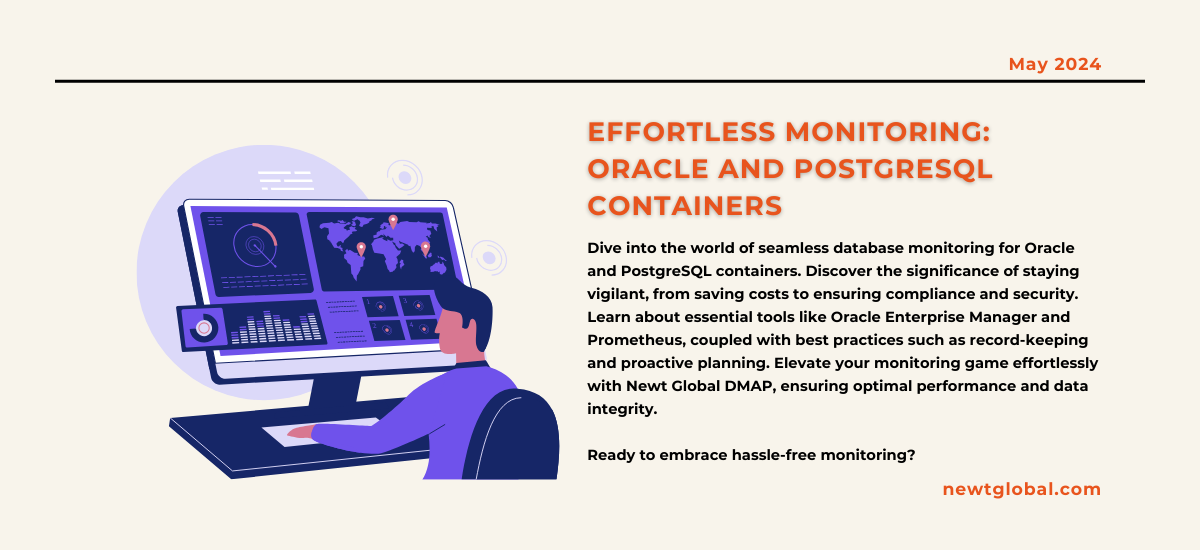
In today’s fast-moving digital world, databases are like the heart of every application. They power everything from cool websites to complex cloud services. Two big players in this area are Oracle and PostgreSQL. But as our technology moves towards using containers with things like Docker and Kubernetes, it’s really important to keep a close eye on Oracle and PostgreSQL containers. This means making sure they’re running smoothly and performing well. This blog post is here to help with that, explaining how to monitor them easily, whether you’re an experienced database administrator or just someone who loves tech.
Importance of Monitoring
-
- Saving Money: Keeping an eye on things helps you spot where resources might be wasted, so you can use them more efficiently and save money.
-
- Planning Ahead: Monitoring lets you see how much resources you’re using and predict what you’ll need in the future. This helps you make sure you have enough without wasting anything.
-
- Following Rules: Monitoring is important for sticking to rules about how data should be handled. It helps you keep data safe and private, following laws and industry standards.
-
- Staying Safe: Monitoring is crucial for making sure your data stays safe, and you’re prepared if something goes wrong. It helps you avoid losing data or having downtime if there’s a problem.
-
- Predicting Problems: Advanced monitoring tools can even predict when something might go wrong, so you can fix it before it becomes a big issue.
Tools and Techniques for Monitoring
There are lots of tools out there for keeping an eye on Oracle and PostgreSQL containers. Some popular ones include:
-
- For Oracle: Oracle Enterprise Manager, Prometheus and Grafana and Datadog.
-
- For PostgreSQL: pgAdmin, Prometheus and Grafana and Datadog.
Best Practices for Effective Monitoring
-
- Keep Good Records: Make sure you’re keeping track of what’s happening with your databases, so you can spot any problems early.
-
- Plan for the Future: Think ahead about what your databases might need in terms of resources, so you can make sure you’re ready.
-
- Be Ready for Problems: Have a plan in place for what to do if something goes wrong with your databases.
-
- Keep Things Secure: Make sure your databases are following the rules for keeping data safe and private.
-
- Aim for Efficiency: Keep an eye on how well your databases are performing and try to make them work as efficiently as possible.
Final Reflections
Monitoring your Oracle and PostgreSQL containers doesn’t have to be hard work. With the right tools and know-how, you can make sure your databases run smoothly and safely. By following the tips and best practices in this post, you’ll be able to handle database monitoring like a pro, keeping your digital world running smoothly.
And if you want an easy way to monitor your Oracle and PostgreSQL containers, check out Newt Global DMAP. It’s a comprehensive solution that makes monitoring simple, ensuring your databases perform well and stay secure and compliant. With Newt Global DMAP, you can save money, plan for the future, and keep your data safe and available whenever you need it.
Newt Global DMAP is a world-class product enabling mass migration of Oracle Db to cloud-native PostgreSQL faster, better, and cheaper. Whether you’re looking to shift your databases to a more modern, cloud-native setup or simply want to streamline your current monitoring processes, Newt Global DMAP is designed to support your goals.
Ready to take your database monitoring and migration to the next level? Visit us at newtglobal.com to learn more about how Newt Global DMAP can transform your database infrastructure. And if you have any questions or need further information, don’t hesitate to reach out to us at marketing@newtglobalcorp.com.
Take the first step towards a more efficient, secure, and cost-effective database management system with Newt Global DMAP.
